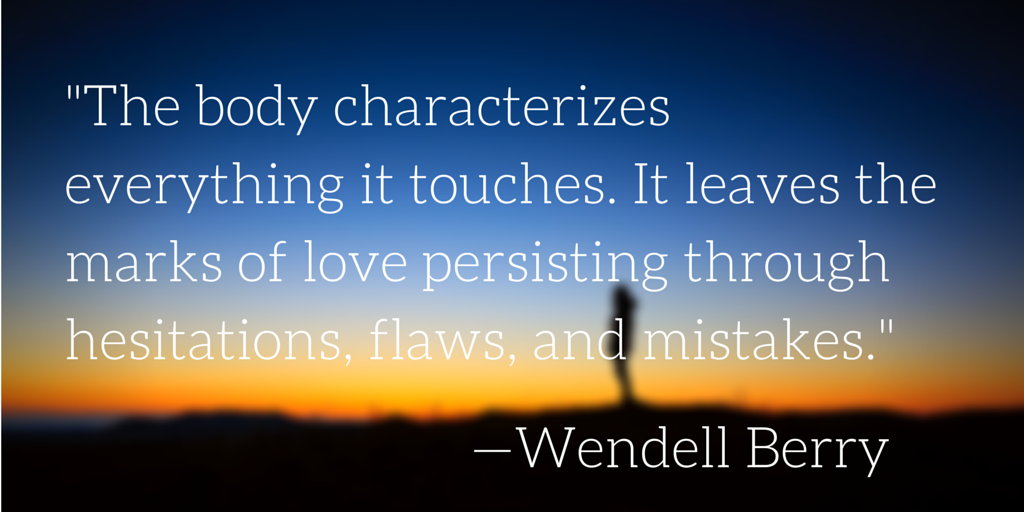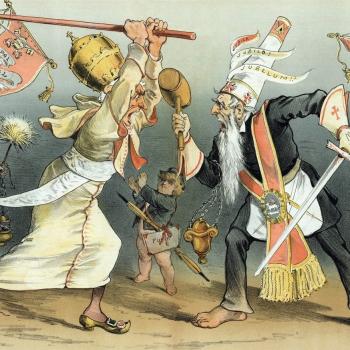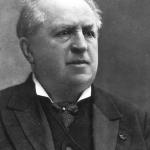As a man, I have prophets of machismo telling me that purebred masculinity is premeditation and rationality—manhood is a stoic stare. It is disembodiment. In Aristotle’s philosophy, there was something called an act/potency distinction—Aristotle made the distinction to explain (1) our ability to change the world (act), and (2) our our capacity for being changed by the world (potency; pathē). “Act” connotes control; “potencty”/”passivity” connotes being-moved.
In the ancient world, the act/potency distinction was manifested by humans in terms of masculinity and femininity. Women were more body-creatures, whose pathē (potency) determined their existence, while men were called to exemplify energia: “Act,” “Effect,” “Productivity,” “Work,” “Supra-passion.” Women are emotional and men are rational, so the story goes. I have that voice in my ear every day.
That’s why we have such a hard time with a God who feels—perhaps because he then seems too feminine. Wendell Berry helped me today to remember the goodness of embodiment—nay,
that the necessity of remembering that my emotions which come from the deepest depths (Greek: the splagchnon) must not be forgotten.
The feelings of the body should be received and welcomed and understood—they often bring a message; and if we have the right skills to hear our emotions well, they can be a better prophet than the world. Berry melts us like butter:
“The body characterizes everything it touches. What it makes it traces over with the marks of its pulses and breathings, its excitements, hesitations, flaws, and mistakes. On its good work, it leaves the marks of skill, care, and love persisting through hesitations, flaws, and mistakes. And to those of us who love and honor the life of the body in the world, these marks are precious things, necessities of life.”[1]
Love, Berry? Ah, yes. We are not merely mind—the mental is the sidecar of the spiritual-physical. We are not machines. We refuse ascend the hill of the stoic—we will not make the Hajj to sacrifice the body and its prophecies for a measly allowance of tolerance-love. We would let them go before we let ourselves go:
“I know that there are some people, perhaps many, to whom you cannot appeal on behalf of the body. To them, disembodiment is a goal, and they long for the realm of pure mind—or pure machine; the difference is negligible. Their departure from their bodies, obviously, is much to be desired, but the rest of us had better be warned: they are going to cause a lot of dangerous commotion on their way out.”[2]
To be a man (and to be a human) is to be a body—and it is neither inferior nor feminine to be affected. It is human, and it is divine—we characterize the world because we were bestowed with the sacred power of the divine image. We are affected and produce effects because we are made in the image of the one who is affected and produces effects. Our bodies tell us truth because God tells us truth. Whatever the case, our bodies—their feelings and messages and intuitions and loves—are indispensable to our humanity. We love kind of crazy because, well, so does he (See: the Old Testament; cf. also the Cross). God made his greatest mark on the world by taking on a body. Let’s not escape our bodies, or even think we need to try.
[1] Wendell Berry, The Art of Commonplace: The Agrarian Essays of Wendell Berry (Berkeley:Counterpoint, 2002), 78.
[2] Ibid.
















